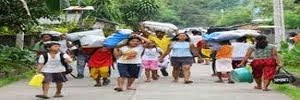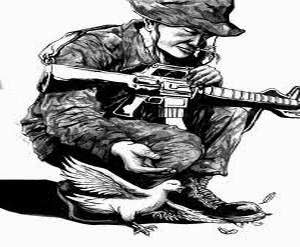From the Website of the President
The Philippines has become more open and diversified, says Palace official
January 15, 2015
The country has become more open and diversified since 1995, when Pope John Paul II visited the country, a Palace official has said.
The country has become more open and diversified since 1995, when Pope John Paul II visited the country, a Palace official has said.
The Philippines remains the largest Christian country in Asia,
although some Filipinos have moved to other segments of the religious
sector, Communications Secretary Herminio Coloma, Jr. said during a
press conference at the Manila Hotel on Thursday.
Secretary Coloma made the statement when asked to compare the country’s conditions today to conditions two decades ago. He was also asked to comment on the changing views of Filipinos on the Catholic faith.
For the past several years, Filipinos have become more hospitable to a broader range of views and options, he said, noting that several reforms have been implemented in the Philippines.
“We have also gone into reforms, such as the responsible parenthood and reproductive health bill. Perhaps, that is also something that is worth noting as a departure from the situation in 1995,” he said.
Another significant change is the increase in the country’s population, he said, emphasizing that in 1995, there were less than 68 million people, compared to 100 million Filipinos today.
A huge number of people is an asset to the country, he said, adding that the Philippines finds itself in a demographic sweet spot, where a big percentage of the population belongs to the youth, an economically productive sector.
“At the same time, this provides our country a very valuable resource for implementing our development programs,” he said.
“As these segments of the population prosper, we are also creating a healthier economy, a broader consumer mass base that could provide the propulsion for sustained growth.”
However, to attain progress, the government has to provide the people both physical infrastructure and intellectual capacity for them to become more productive, Coloma explained, noting that this is the focus of the administration.
The government’s socio-economic development programs would come into play to attain continuing growth, he said.
For instance, in the P2.6-trillion 2015 national budget, the biggest allocation goes to socio-economic development and social protection, Coloma noted.
The focus of the administration, he said, is to fight poverty and the government has been carrying out a totally new paradigm in tackling the problem.
The conventional wisdom was that government could just focus on attaining macroeconomic targets like GDP growth, and hope that there will be a ripple effect that would lift the poor out of poverty, he said.
The administration has changed its approach, he pointed out, adding that now, there is a purposive and deliberate effort to take the fruits of economic development directly to the doorstep of Filipino families living in poverty.
This is being done through the government’s Conditional Cash Transfer Program that keeps children in school and ensures the well-being of pregnant women, he explained.
The Aquino government has already expanded the program to cover more poor Filipinos, Coloma said, adding that the program is in line with the Millennium Development Goal of reducing maternal and child mortality.
“This is anchored upon providing as many of our people the wherewithal to be included in the mainstream of economic growth under a new and purposive approach that was not there 20 years ago,” he said.
“So I think those are some of the essential differences that we may wish to look at.”
Pope Francis arrived in Manila on Thursday afternoon for a five-day visit to the Philippines. The head of the Roman Catholic Church will meet with President Benigno S. Aquino III on Friday morning before continuing his activities in Manila and Leyte this weekend.
Secretary Coloma made the statement when asked to compare the country’s conditions today to conditions two decades ago. He was also asked to comment on the changing views of Filipinos on the Catholic faith.
For the past several years, Filipinos have become more hospitable to a broader range of views and options, he said, noting that several reforms have been implemented in the Philippines.
“We have also gone into reforms, such as the responsible parenthood and reproductive health bill. Perhaps, that is also something that is worth noting as a departure from the situation in 1995,” he said.
Another significant change is the increase in the country’s population, he said, emphasizing that in 1995, there were less than 68 million people, compared to 100 million Filipinos today.
A huge number of people is an asset to the country, he said, adding that the Philippines finds itself in a demographic sweet spot, where a big percentage of the population belongs to the youth, an economically productive sector.
“At the same time, this provides our country a very valuable resource for implementing our development programs,” he said.
“As these segments of the population prosper, we are also creating a healthier economy, a broader consumer mass base that could provide the propulsion for sustained growth.”
However, to attain progress, the government has to provide the people both physical infrastructure and intellectual capacity for them to become more productive, Coloma explained, noting that this is the focus of the administration.
The government’s socio-economic development programs would come into play to attain continuing growth, he said.
For instance, in the P2.6-trillion 2015 national budget, the biggest allocation goes to socio-economic development and social protection, Coloma noted.
The focus of the administration, he said, is to fight poverty and the government has been carrying out a totally new paradigm in tackling the problem.
The conventional wisdom was that government could just focus on attaining macroeconomic targets like GDP growth, and hope that there will be a ripple effect that would lift the poor out of poverty, he said.
The administration has changed its approach, he pointed out, adding that now, there is a purposive and deliberate effort to take the fruits of economic development directly to the doorstep of Filipino families living in poverty.
This is being done through the government’s Conditional Cash Transfer Program that keeps children in school and ensures the well-being of pregnant women, he explained.
The Aquino government has already expanded the program to cover more poor Filipinos, Coloma said, adding that the program is in line with the Millennium Development Goal of reducing maternal and child mortality.
“This is anchored upon providing as many of our people the wherewithal to be included in the mainstream of economic growth under a new and purposive approach that was not there 20 years ago,” he said.
“So I think those are some of the essential differences that we may wish to look at.”
Pope Francis arrived in Manila on Thursday afternoon for a five-day visit to the Philippines. The head of the Roman Catholic Church will meet with President Benigno S. Aquino III on Friday morning before continuing his activities in Manila and Leyte this weekend.
Office of the President Website
OTHER HUMAN RIGHTS PROMOTIONS WEBSITES
PROTECTION AND PROMOTION OF HUMAN RIGHTS
------------------------------------------------------------------------------------------------
----------------------------------------------------------------------------
----------------------------------------------------
----------------------------------------------------------------------------
----------------------------------------------------



























0 comments:
Post a Comment